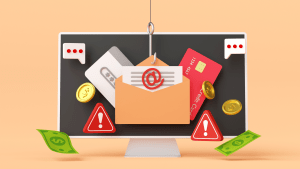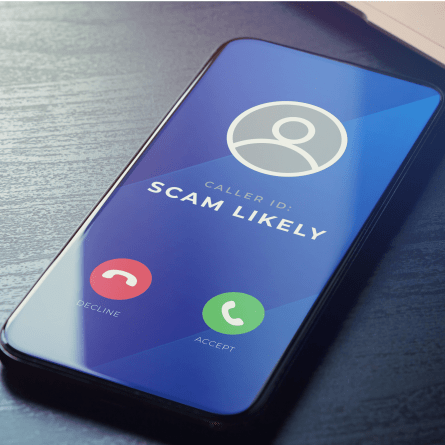 In this world of growing technology, robocalls, and AI facades, it’s becoming increasingly difficult to figure out what is real and what isn’t. If the recent Willy's Chocolate Experience, opens a new window in Glasgow is anything to go by, scams can happen anywhere, to anyone and they come in different shapes and forms.
In this world of growing technology, robocalls, and AI facades, it’s becoming increasingly difficult to figure out what is real and what isn’t. If the recent Willy's Chocolate Experience, opens a new window in Glasgow is anything to go by, scams can happen anywhere, to anyone and they come in different shapes and forms.
Yes, It Can Happen to You
You may think that you are “too smart” to fall for a scam, but I’m here to tell you that falling victim to a scam is not about intelligence, age, or class. Anyone can easily fall for a false call or email if they are not careful.
I’m a librarian with a master’s degree in information and work with technology all day, and even I almost fell victim to a phishing email. It was early in the workday, and I had just finished helping some particularly inquisitive patrons with questions about their phones, booking flights, and Facebook when I finally had a chance to take a breather at my desk.
Tips: Knowing What Not to Do is as Important as Knowing What to Do.
I had just sat down when I saw an email on my phone from PayPal about a recent transaction. Knowing I hadn’t bought anything recently, I immediately started to panic (the exact opposite of what I should’ve done).
Tip #1: Do your best to keep a clear head when get an alarming email or text message. This was my first mistake. Scammers rely on you panicking, being stressed or overemotional so that you make rash decisions.
The email had an invoice attached for a McAfee subscription for $600, and the same attachment had a number to call for customer service. Without thinking, I called it and started speaking to what I thought was PayPal customer service.
I made multiple mistakes here. I opened the attachment in the email, and I called the number provided.
Tip #2: Do not open attachments without verifying the email address, subject, and body. Scam emails, known as phishing, will generally have typos or errors and the email address will look weird or unprofessional.
Tip #3: Do not call any numbers provided in the email or attachments. If you think you need to contact customer support, look for the number on the company’s website and call that one.
The conversation seemed normal enough, but after explaining this false charge, the person on the line claimed that I was a victim of identity theft and that this was not the only charge I had. They “transferred” me to the "Federal Trade Commission" where a different “agent” started to explain the extent of the damage to my credit. They emphasized how serious this was which worried me. Then, the so-called agent explained that I was about to lose thousands of dollars, and their solution was for me to give them all sorts of info so they could transfer the money back to me once it was taken out.
Tip #4: Government agencies will never contact you for money or information. Scammers will pretend to be from legitimate businesses or the government, even going so far as to use real employees' names or numbers, but government entities will never ask for personal information over the phone.
Tip #5: Scammers ask for money in odd and specific ways. They may ask you to pay them in gift cards, cryptocurrency, or payment apps. They might also ask for your bank info to wire money or send a check to you. These are not legitimate and are surefire signs of scams.
While on the phone, I was checking my bank and PayPal statements and saw no fraudulent charges for anything. This was the straw that broke the camel’s back, and I felt a wave of clarity hit me: I was getting scammed.
I quickly hung up the phone, called my bank, and explained the situation. While I was embarrassed, they were very nice and assured me that as long as I didn't give out my personal info everything seemed okay and that they would monitor my account.
 Thankfully, I was able to stay safe because I recognized the scam and stopped before I gave away any personal information. Keep reading for some more tips for recognizing and avoiding scams!
Thankfully, I was able to stay safe because I recognized the scam and stopped before I gave away any personal information. Keep reading for some more tips for recognizing and avoiding scams!
- If you’re unsure if you’ve received something trustworthy, ask a friend, family member, or coworker for a second set of eyes - A neutral party can help you decipher a legitimate email or message from a scam.
- Resist the urge to act immediately – scammers usually pressure you to act quickly either to claim a prize or avoid some charge or consequence. Reputable businesses will give you some time to make a decision
- Be cautious when talking to people online – People online can easily lull you into a sense of trust as a friend or romantic partner, but be wary of giving your info out to someone you’ve never seen face-to-face
- Be wary of cold calls, even from recognizable numbers – Nowadays, it’s easy for scammers to use technology to change the number they are calling from. Block suspicious callers and keep your phone/computer updated for current security software
- Add spending alerts to your bank accounts - Most banks allow you to opt-in for notifications that alert you when any transaction on your account exceeds a specified amount. This can help you catch fraudulent charges, and track your spending.
What to do if you think you have fallen for a scam
If you think your information has been compromised, visit IdentityTheft.gov, opens a new window to report it.
Stay Up-to-Date and Keep Learning
If you would like to report attempted phishing, visit the Federal Trade Commission website, opens a new window. Their site also has more articles and information on how to stay safe and avoid scams.
Use your library card to access DigitalLearn, opens a new window, one of our online databases for handouts and classes on how to stay safe online.
If you’d like to learn more about scams, technology, and internet safety, check out the books below or head over to Kanopy, opens a new window for documentaries on Technology and the Internet




Add a comment to: How to Avoid Getting Scammed